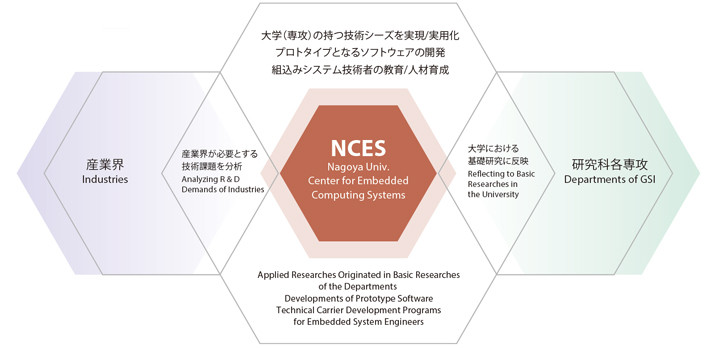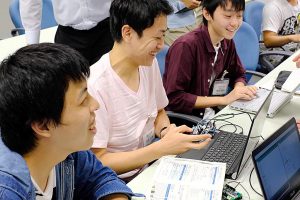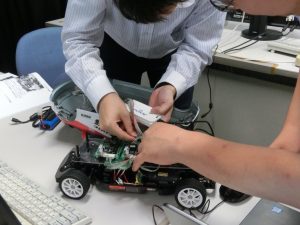More about Center for Embedded Computing systems
The technology of “embedded systems”, which is a computer system embedded in various equipment and machines that help control them, is a very important technology to support our country’s manufacturing industry. For example, many computers are embedded in modern automobiles for various purposes. Embedded system technology is indispensable for the advancement of the automobile industry.
The Center for Embedded Computing Systems (NCES) was established in April, 2006 as an attached center of the Graduate School of Information Science due to the strong demand from the industry for technology and human resource development in the field of embedded systems. The Center aims to formulate the research and educational bases for embedded system technology through collaboration with the industry. To date, we have worked on a number of research and human resource development projects. In particular, we are focusing on consortium-type collaborative research, in which more than one companies take part in the research and development project set up by NCES.
Activity Scheme

Research and Educational Projects (As of April 2020)
Major research and development projects
●AUTOSAR Adaptive Platform
Vehicl platform for systems such as ADAS and autonomous driving function.
●Dynamic Map 2.0
Support for the laying of a foundation for cooperative ITS
(Intelligent Transport Systems) and the creation of new services.
●Security Systems for Next Generation In-Vehicle Network
Research into next generation, high reliability in-vehicle networks.
Human resource development project
●enPiT2 Emb
Educate undergraduate students on practical
embedded system technologies
●enPiT-Pro Emb
Educate engineers in the workforce on practical
and systematic automotive and IoT system technologies
Faculty Members
Executive Director / Professor TAKADA, Hiroaki
Designated Professor / Director YAMAMOTO, Masaki
Designated Professor (Part-time staff ) SATO, Kenya
NAKAMOTO, Yukikazu
Associate Professor MATSUBARA, Yutaka
MASUDA, Yutaka
Designated Associate Professor KURACHI, Ryo
Assistant Professor YAMADA, Shunya
Education Network for Practical Information Technologies

We are engaged in the human resource development project in the field of embedded system (enPiT-Emb) as a cooperative university of enPiT, which was started in FY 2012 through the cooperation of 15 universities nationwide. In this project, mainly for graduate students, we develop human resources who can develop cyber physical systems (CPS) centered on embedded systems, based on our OJL (On the Job Learning) scheme.
In FY 2016, the 2nd term of enPiT(enPiT2) was started. In this new project, mainly for undergraduate students, we foster IT engineers who can develop embedded systems offering new values to our society and have potentials to solve social problem of our country. We are developing four kinds of Pro-abilities. This is Product-ability, Project-ability, Process-ability and Professionalism.

Education Network for Practical Information Technologies
![]()

enPiT-Pro is an information-technology, training program started in 2017 that targets full-time workers. With Nagoya University as the representative school, a total of five universities (Shizuoka University, Hiroshima University, Ehime University, Nanzan University) are helping to educate workers into becoming embedded engineers (enPiT-Pro Emb). When developing embedded systems, workers in the areas of in-vehicle and IoT systems require new technology that they have not learned during their student years. As such, enPiT-Pro Emb focuses on the areas of in-vehicle and IoT systems, and the five universities aim to improve the quality of education by providing lectures for each other. The NCES has a record of educating full-time workers since 2004. Additionally, the NCES has conducted joint research with firms, mainly in the area of in-vehicle system. Utilizing these experiences, the NCES takes on education regarding the in-vehicle system in enPiT-Pro Emb. We are advancing education through arranging an in-vehicle embedded system course composed of multiple subjects, requiring 120 hours of enrollment, which has been authorized as a program certified by the Graduate School of Informatics. Furthermore, we allow for the enrollment of just 1 subject to meet the various needs of full-time workers.


